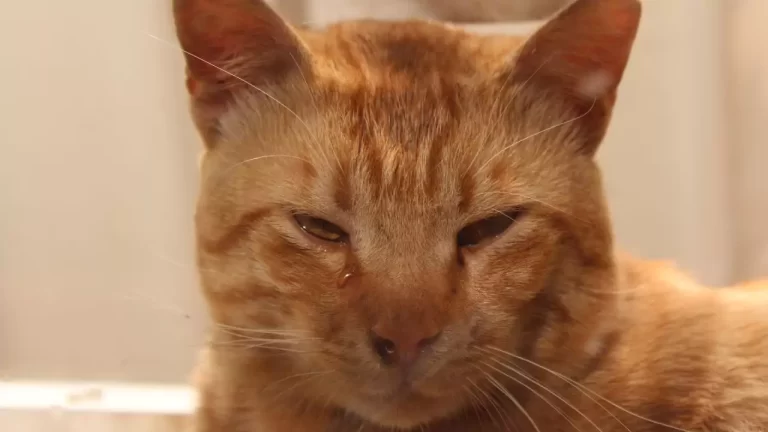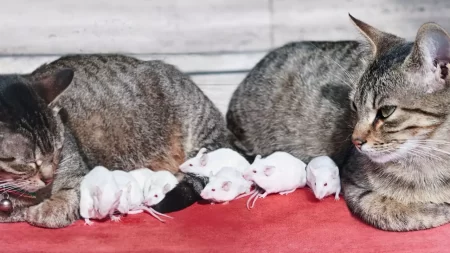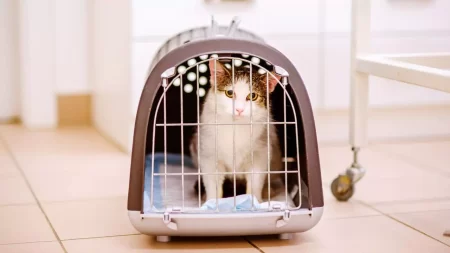Female cats cry at night for a variety of reasons, including boredom, loneliness, lack of exercise, medical conditions, and mating. If your female cat is crying at night, it is important to identify the underlying cause so that you can take steps to address it.
Understanding Why Cats Meow at Night
Cats are crepuscular, active at dawn and dusk. Nighttime activity is possible if they are bored or have other requirements.
Here are some of the most common reasons why female cats cry at night:
- Boredom: Cats need plenty of stimulation, both physical and mental. If they are bored, they may meow excessively, especially at night.
- Loneliness: Cats are social creatures and may meow at night if they are feeling lonely. This is especially true if you have recently changed your routine or if you have adopted a new pet.
- Lack of exercise: Cats need regular exercise to stay healthy and happy. If they don’t get enough exercise during the day, they may be more active at night.
- Feline dementia: Feline dementia is a cognitive disorder that can affect cats of any age. One of the symptoms of feline dementia is nighttime crying.
- Hyperthyroidism: Hyperthyroidism is a condition in which the thyroid gland produces too much thyroid hormone. One of the symptoms of hyperthyroidism is increased vocalization, including nighttime crying.
- Kidney disease: Kidney disease is a common condition in older cats. One of the signs of kidney disease is increased urination, which can lead to nighttime crying.
- Mating: If your female cat is not spayed, she may cry at night when she is in heat. This is because she is trying to attract male cats.
- Fighting: If your cat is involved in a territorial dispute with another cat, she may cry at night to warn the other cat away.
- “Talking” to outdoor cats: If you have an outdoor cat, she may cry at night to communicate with other outdoor cats.
Medical Reasons for Nighttime Crying
In addition to the behavioral reasons listed above, there are also a number of medical conditions that can cause female cats to cry at night. Some of the most common medical causes of nighttime crying include:
- Hyperthyroidism: As mentioned above, hyperthyroidism is a condition in which the thyroid gland produces too much thyroid hormone. One of the symptoms of hyperthyroidism is increased vocalization, including nighttime crying.
- Kidney disease: As also mentioned above, kidney disease is a common condition in older cats. One of the signs of kidney disease is increased urination, which can lead to nighttime crying.
- Pain: If your cat is in pain, she may cry at night to express her discomfort. Pain can be caused by a variety of conditions, including arthritis, infections, and injuries.
Behavioral Solutions to Nighttime Meowing
If your female cat is crying at night due to behavioral reasons, there are a number of things you can do to reduce her vocalizations. Here are a few tips:
- Adjust feeding and playtime routines: Make sure your cat is getting enough to eat and drink during the day, and that she is getting plenty of exercise. You may also want to try feeding her a small meal before bed to help her feel full and content.
- Spend more time with your cat: Cats are social creatures and need regular interaction with their humans. Make sure to spend some time playing with and cuddling your cat each day.
- Adopting another cat: If your cat is lonely, adopting another cat may be a good solution. This can provide her with a companion to play with and cuddle with.
- Providing a variety of toys and scratchers: Cats need plenty of stimulation to keep them from getting bored. Provide your cat with a variety of toys and scratchers to keep her entertained.
- Changing sleeping arrangements: If your cat is crying at night to wake you up, try changing her sleeping arrangements. You may want to try moving her bed to another room or closing the door to your bedroom at night.
If you have tried all of the above tips and your female cat is still crying at night, it is important to take her to the veterinarian to rule out any underlying medical conditions.
Conclusion
Female cats cry at night for a variety of reasons, including boredom, loneliness, lack of exercise, medical conditions, and mating. If your female cat is crying at night, it is important to identify the underlying cause so that you can take steps to address it. If you have tried all of the behavioral solutions listed above and your cat is still crying at night, it is important to take her to the veterinarian to rule out any underlying medical conditions.







